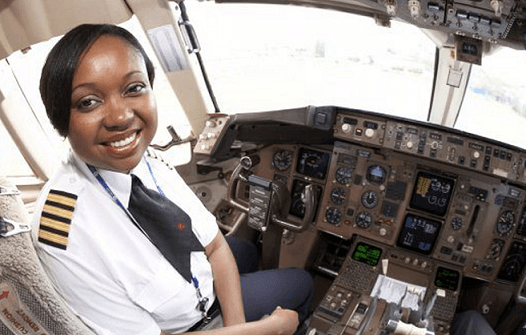Understanding The Requisite Skills That Defines A Successful Pilot

Shippers Guide is the learning page of MMS Plus. Here we answer the five W’s and H of several issues in the shipping and aviation industries. This week’s edition focuses on some crucial tips that could enable one to become a successful airplane pilot. Enjoy it:
An Airplane Pilot
An airline pilot operates a plane’s engines and controls to navigate and fly the vessel. He or she also checks hydraulic and engine systems for pre-flight safety and monitors fuel consumption and aircraft systems in-flight. Prospective pilots must satisfy a set number of flying hours and be in good physical and mental health to fly an airline carrier. Pilots must deal with possible hazards, such as jet lag, fatigue, and unfavorable weather conditions. However, they also might get to travel all over the world.
Whether you’re a fresh student pilot or an airline captain with thousands of hours, these 12 tips will lead you to your greatest success.
Market Your Unique Quality
What makes you stand out? There will be dozens of equally qualified pilots applying for a position, so why should someone choose you? Maybe it’s the ability to do something more than fly. Entering into a role in the safety department, recruitment, or business side of an air carrier is a great way to show you have more value than just inside the cockpit.
If you can’t think of something that makes you stand out from the rest of the pack, start working on a way to do it!
Never Burn Bridges
Aviation is an extremely small community. From the first day you walk into flight school until your last day as a captain, you will run into mutual connections in the strangest of places. Rise above the pilot lounge talk and remember that what you say about coworkers and crewmembers will get around. Not everyone has to like you, but don’t give them an opportunity to dislike you!
Confidence, Not Arrogance
Humility is one of the best virtues a pilot can have. It’s no secret that there’s a lot of “ego” out there in the pilot community, and for good reason… We’re superhumans, we fly, right?
All joking aside, there’s nothing more frustrating than being around an arrogant pilot. Be it your first lesson, first job, or first captain upgrade, remember how fortunate you are to fly. There’s nothing wrong with being confident. It’s actually one of the most important qualities a pilot can have. Just don’t let that confidence turn into arrogance.
Treat Every Checkride Like It’s Your First
Remember how much you studied for you first checkride? Don’t let that motivation slip away. Treat every checkride like it’s your first time in the airplane. It’ll keep you on your toes and steer you away from complacency.
Have A Flexible End-Game
You probably have a “dream job” in mind. That’s a good thing! But don’t let it blind you to the
Respect Crewmembers, Passengers, And Staff Equally
Going back to never burning bridges… Treat every member of your crew and staff with respect, especially when you don’t get along with them. Personalities don’t always mesh well and that’s extremely hard to avoid. Don’t let your disagreements with one person turn into a way for a separate group of people to judge you.
Networking Is Everything
I can’t stress enough that networking means everything in aviation. Getting a job isn’t about what you know, it’s about who you know. Networking starts day one, and shouldn’t ever stop.
Know a pilot with a “dream job?” Buy them lunch and ask how you can get there too! Stay in touch with the people you consider influencers in your life.
Ask Your Crew For Feedback
This is always a good practice, whether you’re a student pilot or airline captain. At the end of a flight, ask for honest, constructive feedback. Don’t take criticism personally. Instead, use it as a way to improve so you don’t make the same mistakes twice.
Do Something To Pay It Forward
There isn’t a better way to show your success than by paying it forward. If you’ve “made it” to one of your goals, help someone in line behind you get there too! EAA’s Young Eagles Program is one great way to do it…
Don’t Judge The Career Choices Of Other Pilots
The absolute best part about becoming a pilot is that you can live and work nearly anywhere in the world. Whether it be choosing a flight school, first job, or airline, don’t judge other pilots for the decisions they make.
If someone wants to know more about why you chose your path, tell them your story, but avoid bashing other options that are available.
Be a smooth operator.
Practice smooth flying. Pilots who make quick, twitchy corrections (or worse, overcorrections) impart a sense of nervousness and unpreparedness, and will stress out their passengers and co-pilots. The smooth pilot creates an aura of calm professionalism in a stressful environment. There are no quick snaps to wing-in-the-ground turns and back to level. Imagine your terrified grandmother is riding in the back, and you’ll be on your way to smoother flying in no time. Most airlines conduct a simulator evaluation; if you are the type of pilot who thinks the yoke has to be moving to call it flying, then there’s a good chance you’ll raise some eyebrows in the back of the box. Worse, the sim operator may be reaching for a barf bag.
Make A Mistake? Admit It, Learn, And Move On!
I can’t stress this final point enough. There is absolutely no way that you can be a perfect pilot. No matter what you do or say, there will be times that you make mistakes. Some will be big and some will be small.
A captain once told me that “the best first officers aren’t the ones with amazing stick stills, they’re the ones that admit when they make a mistake.” I’d take this a step farther… This is true for every pilot, captains and first officers alike.
Admitting a mistake, learning from it, and moving on is the best way to demonstrate your maturity as a pilot.
Culled from Bold Method








